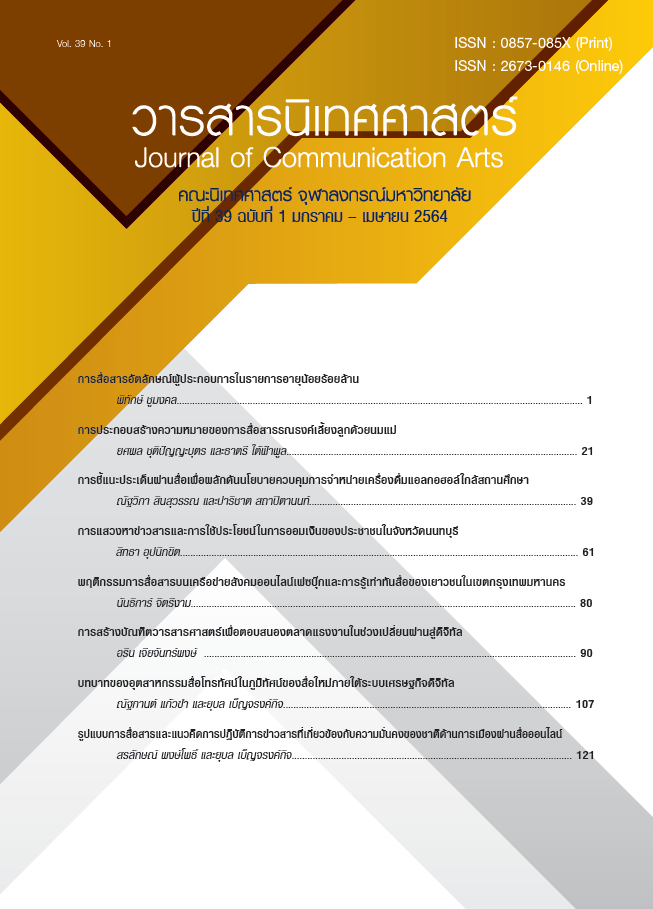Meaning Construction of Breastfeeding Campaign in Thailand
Main Article Content
Abstract
This research paper aims to explain meaning construction of breastfeeding campaign in Thailand and how mothers decode the meaning. The analysis is conducted under theoretical framework of semiology, hegemony, and encoding/decoding from textual analysis of influential Facebook pages, interviews of experts, and a focus group of 8 mothers. It is founded that the meaning of breastfeeding campaign is “breastmilk is the best”, which is constructed by reproducing “infant formula” as the binary opposition. It connotes that being a good mother has to give breastfeeding.” Yet, “breastfeeding” is decoded in 2 meanings: breastfeeding and feeding breastmilk that the latter one can be operated by taking breastmilk from donation. Although there are people who decode as the latter meaning, all participants decode the meaning as breastfeeding. The participant mothers who do not have problems in breastfeeding feel proud and decode as the hegemonic meaning, while the mothers who have the problems negotiate the meaning that taking care of babies is as important as breastfeeding. There is no oppositional decoding found. The researchers suggest that breastfeeding campaign should aim for breastfeeding rather than focusing on breastmilk, and should not alienate infant formula
Article Details
References
การสนทนากลุ่มเรื่องการถอดรหัสการสื่อสารรณรงค์เลี้ยงลูกด้วยนมแม่. (สัมภาษณ์, 1 ธันวาคม 2562)
ไทยรัฐออนไลน์. (2558, 10 มิถุนายน 2558). คนเป็นแม่ต้องรู้! นมผงvsนมเต้า ความต่างราวฟ้ากับเหว. แหล่งที่มา https://www.thairath.co.th/content/504019
นมแม่แบ่งปัน. (2562). วันที่เข้าถึงข้อมูล 31 ธันวาคม 2562 แหล่งที่มา https://www.facebook.com/groups/NommaeSharing/
นมแม่แฮปปี้. (2563). วันที่เข้าถึงข้อมูล 2 มกราคม 2563 แหล่งที่มา https://www.facebook.com/HappyBreastfeeding
นันทวัน ยันตะดิลก. การสื่อสารรณรงค์เลี้ยงลูกด้วยนมแม่ของโครงการสร้างคนไทยสุขภาพดีด้วยนมแม่และการบริโภคผักผลไม้. (สัมภาษณ์, 1 ธันวาคม 2562)
นิษฐา หรุ่นเกษม. (2560). ปัจจัยที่มีผลต่อการสื่อสารรณรงค์การเลี้ยงลูกด้วยนมแม่. Paper presented at the การประชุมวิชาการนมแม่แห่งชาติ ครั้งที่ 6, กรุงเทพมหานคร.
พนัชกร ฟองมูล. (2554). เสียงสะท้อนจากแม่ที่มีอุปสรรคในการเลี้ยงลูกด้วยนมแม่. มหาวิทยาลัยเชียงใหม่, เชียงใหม่.
พรรณวดี ประยงค์. (2562). การใช้ประโยชน์จากสื่อสังคมออนไลน์ในการแสวงหาข้อมูลข่าวสาร ด้านการเลี้ยงลูกด้วยนมแม่ของแม่ ศึกษากรณี เฟซบุ๊กแฟนเพจ “สุธีรา เอื้อไพโรจน์กิจ” วารสารศาสตร์, 12(2). 40-86.
พีระณัฐ ประเสริฐชัย. (2560). ความแตกต่างระหว่างนมแม่และนมผสม. แหล่งที่มา https://www.haijai.com/3609/
ราชกิจจานุเบกษา. (2560). พระราชบัญญัติควบคุมการส่งเสริมการตลาดอาหารสำหรับเด็กทารกและเด็กเล็ก พ.ศ. 2560. ราชกิจจานุเบกษา แหล่งที่มา http://www.ratchakitcha.soc.go.th/DATA/PDF/2560/A/072/1.PDF
โรล็องด์ บาร์ตส์. (2555). มายาคติ (วรรณพิมล อังคศิริสรรพ, Trans.). กรุงเทพฯ: โครงการจัดพิมพ์คบไฟ.
เลี้ยงลูกตามใจหมอ (2563). วันที่เข้าถึงข้อมูล 3 มกราคม 2563 แหล่งที่มา https://www.facebook.com/SpoiledPeddiatrician
วชิระ เพ็งจันทร์. (2560). สารจากอธิบดีกรมอนามัย. Paper presented at the การประชุมวิชาการนมแม่แห่งชาติครั้งที่ 6 "รวมพลัง สร้างสังคมนมแม่ ให้ยั่งยืน", กรุงเทพมหานคร.
วิลาวัณย์ จึงประเสริฐ. (2556). แนวทางการสนับสนุนการเลี้ยงลูกด้วยนมแม่ บริบทกรมการแพทย์. Paper presented at the การประชุมวิชาการนมแม่แห่งชาติ ครั้งที่ 4, กรุงเทพมหานคร.
ศิวาพร รัตนคำแปง. การสื่อสารรณรงค์เลี้ยงลูกด้วยนมแม่จากประสบการณ์ของพยาบาลวิชาชีพ. (สัมภาษณ์, 29 ธันวาคม 2562)
สุทธิดา นาคเจริญ. (2549). รูปแบบการสื่อสารเพื่อประชาสัมพันธ์การส่งเสริมการเลี้ยงลูกด้วยนมแม่. (นิเทศศาสตรมหาบัณฑิต). จุฬาลงกรณ์มหาวิทยาลัย, กรุงเทพมหานคร.
สุธีรา เอื้อไพโรจน์กิจ (2563). วันที่เข้าถึงข้อมูล 2 มกราคม 2563 แหล่งที่มา https://www.facebook.com/SuthiRaXeuxPhirocnKic/
สุภางค์ จันทวานิช. (2559). ทฤษฎีสังคมวิทยา. กรุงเทพฯ: สำนักพิมพ์แห่งจุฬาลงกรณ์มหาวิทยาลัย.
Garwood, P., & Alexander, N. (2018). WHO and UNICEF issue new guidance to promote breastfeeding in health faculities globally. Retrieved April 11, 2018, from https://www.who.int/news-room/detail/11-04-2018-who-and-unicef-issue-new-guidance-to-promote-breastfeeding-in-health-facilities-globally
Hall, S. (2006). Encoding/Decoding. In M. G. Durham & D. M. Kellner (Eds.), Media and Cultural Studies. Malden, MA: Blackwell.
UNICEF. (2015). Breastfeeding. Nutrition. Retrieved July 29, 2015 from https://www.unicef.org/nutrition/index_24824.html


